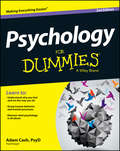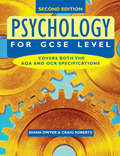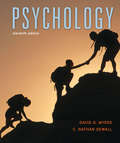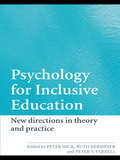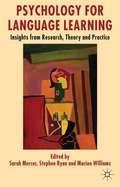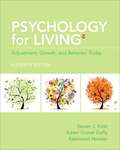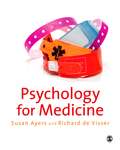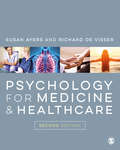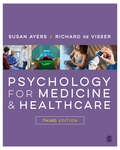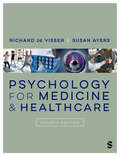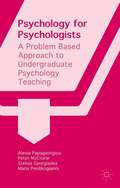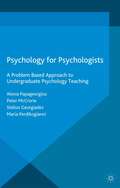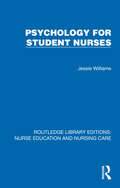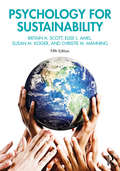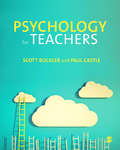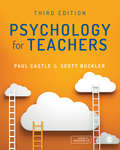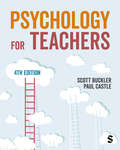- Table View
- List View
Psychology for GCSE Level (500 Tips)
by Craig Roberts Diana DwyerWritten by two experienced psychology teachers and examiners, this textbook provides thorough coverage of both the AQA and OCR GCSE Psychology specifications. The user-friendly layout clearly identifies which sections are pertinent to each specification. The book is produced in attractive full colour with plenty of photographs, pictures and cartoons, and provides a variety of student-friendly features, including: A list of the AQA and/or OCR specification requirements for each topic An everyday-life case study to introduce each chapter Numerous classroom activities Key terms highlighted and defined throughout the text Aims and Learning Outcomes, which highlight the general themes and processes (including why psychology matters, how psychology works, everyday life, ethical issues, diversity, critical thinking and methodology) Research studies with evaluations Clear and concise chapter summaries Exam hints and tips Exam-style questions. This new edition is accompanied by a set of online multimedia resources, including powerpoint lecture courses and multiple-choice questions tests, available free-of-charge to schools who adopt this book as their text.
Psychology for High School
by David G. Myers C. Nathan DeWallTeaching psychological science through writing and interactive media, Psychology for High School takes an integrated approach so that after you read a chapter, you move into working online, getting to put yourself into the role of scientific researcher.
Psychology for Inclusive Education: New Directions in Theory and Practice
by Ruth Kershner Peter Hick Peter T. FarrellWhat can psychology offer inclusive education? Traditionally, special education has looked to psychology for many of its theoretical resources and practical strategies. While those seeking to promote more inclusive education have tended to see psychology and psychologists as part of the problem by providing a rationale for segregation. However, in practice many psychologists today are developing inclusive ways of working, and are paying attention to psychological theories that underpin inclusive education. Psychology for Inclusive Education reframes the contribution of psychology in terms of its relevance to inclusion and will show how psychological theories of learning and human development are compatible with inclusive education. Part 1 explores psychological theories relevant to understanding inclusive education and Part 2 looks at how psychology can contribute to promoting more inclusive education in practice. Chapters cover: how psychologists can collaborate with teachers for inclusive solutions Vygotsky's theories of learning and their significance for inclusion the challenge of developing pedagogies for inclusion sociocultural understandings of learning in inclusive classrooms the role of emotion in learning and inclusion cooperative learning and inclusion the challenges and tensions of inclusion and high standards for schools the practice of dynamic assessment as an inclusive alternative to IQ social justice and inclusive psychology Bringing together a highly distinguished list of international contributors from the UK, USA and South Africa and including practising educational psychologists, this book will link theory to practice in schools and classrooms. International in focus and at the very cutting edge of the field, this is essential reading for all those interested in the development of inclusive education.
Psychology for Language Learning
by Marion Williams Sarah Mercer Stephen RyanOffering a timely snapshot of current theory and research in the field of psychology in foreign language learning, this book is accessible to both specialists and non-specialists. Each chapter focuses on a different psychological construct and provides an overview of current thinking in the area drawing on insights from educational psychology.
Psychology for Living: Adjustment, Growth, and Behaviour Today
by Eastwood Atwater Karen Grover Duffy Steven J. KirshThe scope of Psychology for Living draws material from the major perspectives of psychology, including the psycho dynamic, ecological, cognitive-behavioral, and humanistic viewpoints. The goal of the text is based firmly on increasing readers' understanding as well as their knowledge about adjustment, in order that they may continue learning and growing on their own.
Psychology for Medicine
by Susan Ayers Richard De VisserA recent UK report emphasized the need for greater integration of psychological/social sciences into the traditional biomedical curriculum--a trend in the US also. After explaining barriers to an biopsychosocial approach, Ayers and de Visser (psychology, Brighton & Sussex Medical School) discuss psychological theories and research relevant to many aspects of clinical practice; brain development and the effects of social context on behavior; psychology relevant to body systems; and communication skills and psychological interventions in clinical practice, e. g. , in regard to disease risk factors. Chapters include case studies, clinical notes, activities, further reading, exam preparation questions, and color illustrations. Annotation ©2011 Book News, Inc. , Portland, OR (booknews. com)
Psychology for Medicine and Healthcare
by Susan Ayers Richard De VisserWhy is psychology important in healthcare practice? Each person is a unique mix of thoughts, emotions, personality, behaviour patterns, and their own personal history and experiences. Having a thorough understanding of the psychological aspects of medicine and health has become ever more important to ensure that patients receive excellent care and treatment. The new edition is fully up to date with current practices and now includes: New section on epigenetics New examples of models of behaviour focusing on alcohol and smoking A greater focus on the role of partners/family as specific sources of social support in various contexts Increased coverage on NICE guidance More emphasis on psychological interventions The new edition of this bestselling textbook continues to provide a comprehensive overview of the research, theory, application and current practices in the field and is essential reading for all medicine and healthcare students.
Psychology for Medicine and Healthcare
by Susan Ayers Richard De VisserWhy is psychology important in healthcare practice? Each person is a unique mix of thoughts, emotions, personality, behaviour patterns, and their own personal history and experiences. Having a thorough understanding of the psychological aspects of medicine and health has become ever more important to ensure that patients receive excellent care and treatment. The new edition is fully up to date with current practices and now includes: New section on epigenetics New examples of models of behaviour focusing on alcohol and smoking A greater focus on the role of partners/family as specific sources of social support in various contexts Increased coverage on NICE guidance More emphasis on psychological interventions The new edition of this bestselling textbook continues to provide a comprehensive overview of the research, theory, application and current practices in the field and is essential reading for all medicine and healthcare students.
Psychology for Medicine and Healthcare
by Susan Ayers Richard de VisserAs our understanding of what constitutes ‘good health’ grows, so does our need to understand the psychological aspects of medicine and health, as well as the psychological interventions available in healthcare. This new edition of this bestselling textbook provides a comprehensive overview of the research, theory, application and current practices in the field, covering topics from epigenetics to social determinants of health and transdiagnostic approaches to mental health and everything in between. An essential read for all medicine and healthcare students, this text is now accompanied by a suite of online resources for all your learning needs.
Psychology for Medicine and Healthcare
by Susan Ayers Richard de VisserAs our understanding of what constitutes ‘good health’ grows, so does our need to understand the psychological aspects of medicine and health, as well as the psychological interventions available in healthcare. This new edition of this bestselling textbook provides a comprehensive overview of the research, theory, application and current practices in the field, covering topics from epigenetics to social determinants of health and transdiagnostic approaches to mental health and everything in between. An essential read for all medicine and healthcare students, this text is now accompanied by a suite of online resources for all your learning needs.
Psychology for Medicine and Healthcare
by Richard de Visser Susan AyersAs our understanding of what constitutes ‘good health’ grows, so does our need to understand the psychological aspects of medicine and health, as well as the psychological interventions available in healthcare. This bestselling textbook provides a comprehensive overview of research, theory, application, and current practices in the field. The new edition delves deeper into critical topics such as diversity and health inequalities, cultural influences on healthcare, the rise of digital healthcare solutions, and the well-being of healthcare practitioners. With updated case studies, research examples, and online resources, this essential text equips medical and healthcare students with the knowledge and tools to navigate the evolving landscape of health psychology. Richard de Visser is a Professor of Health Psychology at Brighton & Sussex Medical School. Susan Ayers is a Professor of Maternal and Child Health at City St George’s, University of London in the School of Health and Medical Sciences.
Psychology for Medicine and Healthcare
by Richard de Visser Susan AyersAs our understanding of what constitutes ‘good health’ grows, so does our need to understand the psychological aspects of medicine and health, as well as the psychological interventions available in healthcare. This bestselling textbook provides a comprehensive overview of research, theory, application, and current practices in the field. The new edition delves deeper into critical topics such as diversity and health inequalities, cultural influences on healthcare, the rise of digital healthcare solutions, and the well-being of healthcare practitioners. With updated case studies, research examples, and online resources, this essential text equips medical and healthcare students with the knowledge and tools to navigate the evolving landscape of health psychology. Richard de Visser is a Professor of Health Psychology at Brighton & Sussex Medical School. Susan Ayers is a Professor of Maternal and Child Health at City St George’s, University of London in the School of Health and Medical Sciences.
Psychology for Psychologists: A Problem Based Approach to Undergraduate Psychology Teaching
by Alexia Papageorgiou Peter McCrorie Stelios Georgiades Maria PerdikogianniThis book uses psychological theories and learning processes, such as Problem Based Learning (PBL), to provide a new approach for teaching psychology at an undergraduate level and prevent diminishing motivation. It creates a detailed example of a psychology degree using the PBL method and suggests how a week of the course could be planned.
Psychology for Psychologists: A Problem Based Approach to Undergraduate Psychology Teaching
by Alexia Papageorgiou Peter McCrorie Stelios Georgiades Maria PerdikogianniThis book uses psychological theories and learning processes, such as Problem Based Learning (PBL), to provide a new approach for teaching psychology at an undergraduate level and prevent diminishing motivation. It creates a detailed example of a psychology degree using the PBL method and suggests how a week of the course could be planned.
Psychology for Student Nurses (Routledge Library Editions: Nurse Education and Nursing Care)
by Jessie WilliamsOriginally published in 1954 and as a second edition in 1957, this book provides a survey of the main psychological principles necessary to nurses in their work. As well as being a textbook for nurses in training, it was written in such a way as to be of value to qualified nurses as well. The author drew widely on her experience as psychologist in London Teaching Hospitals including Guys, Great Ormond Street and University College Hospital, and as a lecturer to nurses in training. She illustrates her theme with many practical examples drawn from hospital experience. This is a careful and scientific study of psychology applied to nursing which is readable and avoids the use of unnecessary technical terms.
Psychology for Sustainability
by Susan M. Koger Elise L. Amel Britain A. Scott Christie M. ManningPsychology for Sustainability applies psychological science to so-called environmental problems that manifest when human behavior disrupts and degrades natural systems. Drawing on environmental psychology, ecopsychology, conservation psychology, and related disciplines, the authors provide an extensive review of relevant theory and research in a lively and easy-to-read style. This edition represents a substantial revision and expansion spurred by a burgeoning body of research and by global ecological, political, and social developments. Particular attention is paid to environmental justice and collective action for systems change. More than one-third of the content is entirely new, and there are more than nine hundred new references. This edition also features a new full-color design and over two hundred full-color figures, tables, and photos. Timely topics include climate change, biodiversity loss, environmental racism, Indigenous perspectives, social media, and COVID-19 and other pandemics. Content retained from the previous edition has been updated throughout. The twelve chapters are organized into four parts: What on Earth Are We Doing includes a prologue on psychology as a sustainability science, followed by three chapters that provide an overview of the ecological crisis and its historical origins, and a vision for a sustainable future. Psychology for a Sustainable Future encompasses five chapters on research methods, theory, and findings pertinent to understanding and shifting unsustainable behavior. What’s Good for the Planet is Good for Us includes two chapters that address the reciprocal relationship between planetary and human health. Being the Change We Want to See introduces two new chapters to inspire readers to take what they have learned and apply it as changemakers in the world. The first is about collective action for systemic change. The second presents a positive psychology perspective on how to tackle the ecological crisis in a way that promotes wellbeing and resilience and is personally meaningful and fulfilling. Carefully tailored to the length of a standard college semester, Psychology for Sustainability is essential reading for courses on sustainability across disciplines. It will be invaluable to people outside academia as well, including policymakers, legislators, and those working on sustainable communities. The text is also supplemented with online resources for instructors.
Psychology for Sustainability: 4th Edition
by Susan M. Koger Elise L. Amel Britain A. Scott Christie M. ManningPsychology for Sustainability, 4th Edition -- known as Psychology of Environmental Problems: Psychology for Sustainability in its previous edition -- applies psychological theory and research to so-called "environmental" problems, which actually result from human behavior that degrades natural systems. This upbeat, user-friendly edition represents a dramatic reorganization and includes a substantial amount of new content that will be useful to students and faculty in a variety of disciplines--and to people outside of academia, as well. The literature reviewed throughout the text is up-to-date, and reflects the burgeoning efforts of many in the behavioral sciences who are working to create a more sustainable society. The 4th Edition is organized in four sections. The first section provides a foundation by familiarizing readers with the current ecological crisis and its historical origins, and by offering a vision for a sustainable future.The next five chapters present psychological research methods, theory, and findings pertinent to understanding, and changing, unsustainable behavior. The third section addresses the reciprocal relationship between planetary and human wellbeing and the final chapter encourages readers to take what they have learned and apply it to move behavior in a sustainable direction. The book concludes with a variety of theoretically and empirically grounded ideas for how to face this challenging task with positivity, wisdom, and enthusiasm. This textbook may be used as a primary or secondary textbook in a wide range of courses on Ecological Psychology, Environmental Science, Sustainability Sciences, Environmental Education, and Social Marketing. It also provides a valuable resource for professional audiences of policymakers, legislators, and those working on sustainable communities.
Psychology for Teachers
by Scott Buckler Paul CastleEvery child is an individual whose knowledge and understanding needs to be developed in ways that help them succeed. How do you manage this alongside the realities of the curriculum? How do you achieve this for a full classroom of expectant learners? Psychology for Teachers explains how psychology can be intelligently applied to the classroom to meet the needs of different learners. It encourages you to review your own practice to develop a personal teaching style, supported by research findings and an awareness of the factors underpinning high-quality teaching. Focusing on how an understanding of psychological theory can support effective teaching and learning this book contains case studies and tasks to make sure that you really understand how theory can be meaningfully applied in the classroom. Additional online materials The book is supported by a companion website including resources such as free journal articles, additional activities and links to relevant information. Scott Buckler is a Senior Lecturer and Paul Castle is a Chartered Psychologist, Health Care Professions Council-registered and Senior Lecturer. Both are based at the University of Worcester.
Psychology for Teachers
by Scott Buckler Paul CastlePsychology for Teachers explains how psychology can be intelligently applied to the classroom to meet the needs of different learners. It encourages teachers to review their own practice to develop a personal teaching style, supported by research findings and an awareness of the factors underpinning high-quality teaching. Focusing on how an understanding of psychological theory can support effective teaching and learning this book contains case studies and tasks to make sure that trainees really understand how theory can be meaningfully applied in the classroom. This new edition now comes with three brand new sections: Mental health, wellbeing & resilience Psychological skills Evidence-based teaching This book is relevant for anyone undertaking an Education Studies degree or doing Primary or Secondary teacher training - particularly for the professional studies teaching topics.
Psychology for Teachers
by Scott Buckler Paul CastlePsychology for Teachers explains how psychology can be intelligently applied to the classroom to meet the needs of different learners. It encourages teachers to review their own practice to develop a personal teaching style, supported by research findings and an awareness of the factors underpinning high-quality teaching. Focusing on how an understanding of psychological theory can support effective teaching and learning this book contains case studies and tasks to make sure that trainees really understand how theory can be meaningfully applied in the classroom. This new edition now comes with three brand new sections: Mental health, wellbeing & resilience Psychological skills Evidence-based teaching This book is relevant for anyone undertaking an Education Studies degree or doing Primary or Secondary teacher training - particularly for the professional studies teaching topics.
Psychology for Teachers
by Scott Buckler Paul CastleHow can ideas and concepts from psychology be applied smartly to the classroom to meet the needs of different learners? Supported by research and an awareness of the factors underpinning high-quality teaching, this book encourages teachers, and those training to teach, to examine their own methods in order to develop as confident, evidence-informed professionals. This third edition includes: · A new chapter on the psychology of elearning · A new discussion of applied cognitive theories in the classroom · The use of internationally friendly terminology throughout the book · Some streamlining of content to offer a more cohesive reading experience
Psychology for Teachers
by Scott Buckler Paul CastleHow can ideas and concepts from psychology be applied smartly to the classroom to meet the needs of different learners? Supported by research and an awareness of the factors underpinning high-quality teaching, this book encourages teachers, and those training to teach, to examine their own methods in order to develop as confident, evidence-informed professionals. This third edition includes: · A new chapter on the psychology of elearning · A new discussion of applied cognitive theories in the classroom · The use of internationally friendly terminology throughout the book · Some streamlining of content to offer a more cohesive reading experience
Psychology for Teachers
by Scott Buckler Paul CastleThis is an essential textbook for teachers and those training to teach on applying research from psychology to education. It offers practical advice on ‘what works’ in the classroom. Not only will you understand how to teach effectively but also why, with explanations deeply rooted in theory and practice. Brimming with references to popular culture and packed with a range of tips, tasks, case studies and critical points, this book will keep you informed and intrigued in equal measure. This fourth edition includes: Significant updates to content on cognitive psychology and educational neuroscience; neurodivergence and special educational needs; and supporting mental wellbeing. Condensed and reworked chapters with a stronger focus on practical application in the classroom. Classroom examples described in universal terms to support teachers anywhere in the world.
Psychology for Teachers
by Scott Buckler Paul CastleThis is an essential textbook for teachers and those training to teach on applying research from psychology to education. It offers practical advice on ‘what works’ in the classroom. Not only will you understand how to teach effectively but also why, with explanations deeply rooted in theory and practice. Brimming with references to popular culture and packed with a range of tips, tasks, case studies and critical points, this book will keep you informed and intrigued in equal measure. This fourth edition includes: Significant updates to content on cognitive psychology and educational neuroscience; neurodivergence and special educational needs; and supporting mental wellbeing. Condensed and reworked chapters with a stronger focus on practical application in the classroom. Classroom examples described in universal terms to support teachers anywhere in the world.
